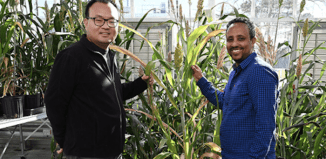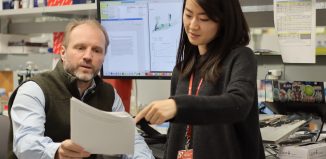BNL’s Stern focuses on nuclear safety and security
Warren Stern is helping win business for a department he just joined a year ago. A senior advisor in the Nonproliferation and National Security Department at Brookhaven National Laboratory, Stern is working on a domestic program through the National Nuclear Security Administration’s Global Threat Reduction Initiative that seeks to enhance security and response capabilities at facilities in the United States that use highly radioactive materials.
As a part of the Response Experts Group, he helps the program “ensure an effective response if there ever is an incident,” he said.
The work with the Office of Global Threat Reduction is “our first work in years” with that office, explained Carol Kessler, the chairwoman of the department where Stern works. Stern, who has helped the BNL group increase its business, “is an excellent proposal ideas person and writer, an important combination for success in this area.”
On a broader level, Stern’s work encompasses deterring potential diversion of nuclear energy into nuclear weapons, ensuring an effective response to any catastrophe, and finding the best use of technology to monitor nuclear sites. “We succeed when we deter others from taking steps,” he said. “The goal is to deter diversions by enhancing the chances of detection.”
Governments and the private sector acquire technology in a variety of ways, Stern said. He and experts at BNL and other national laboratories help these governments acquire the best technology. “When you’re thinking about something as broad as inspections and verifications” of nuclear material, it’s “not as straightforward as going to Consumer Reports,” he said.
Stern also works with a team at BNL to create a course that helps international inspectors prepare for certain types of monitoring. As the course director, he put the exercises together, which includes simulations where he plays the role of a state. The course, which is focused on hands-on work, is designed to train international inspectors related to nonproliferation.
When other countries come to the International Atomic Energy Association, the IAEA sometimes calls on experts like Stern and others at BNL to travel to other regions to compare these country’s laws, regulations and activities in the context of international standards.
Stern journeyed to Lithuania and Jordan to “examine and evaluate” their regulations. Each visit lasted about two weeks. He toured their facilities, had broad access to a range of government officials and emergency response teams.
“Often,” he said, “failures in response have nothing to do with technology and everything to do with basic lines of communication and responsibilities given to a variety of organizations. There is a false understanding of how things would work.”
Experts like Stern try to be aware of the politics of any international situation. If, for example, a nuclear facility is on the border of two countries that don’t have good international relations, he and the advisory team still encourage the need for a unified emergency response approach. “While that may not be feasible politically, it doesn’t keep us from recommending” that as a course of action, he said.
Stern is a “role model” for many people in the department “as a leader on how to think up new ideas for work that will help our customers achieve their goals,” Kessler said.
Stern spends much of his time in Washington, D.C., where many of the government agencies, such as the Department of Energy and the State Department, are headquartered.
Up until he joined BNL, Stern was a long-standing member of the government, where he worked at the State Department, directing the office responsible for developing and implementing U.S. nuclear safety and radiological security policies.
He also worked at the Central Intelligence Agency, where he acted as intelligence officer for the Office of Scientific and Weapons Research. He served as former Sen. Hillary Clinton’s nuclear fellow and adviser in 2002 and 2003, where he offered advice on nuclear energy, waste and safety and security. He was appointed by President Obama to lead the Domestic Nuclear Detection Office at the Department of Homeland Security.
Stern has two children, Benjamin, who is at Virginia Tech, and Matthew, who is in high school.
Stern prides himself on having relied on human energy to commute to his high-powered jobs in Washington, biking the five to seven miles to work each day. He has brought his two-wheeled ride to Long Island, where he enjoys pedaling along the North Shore.
As for what keeps him up at night, Stern said, “We have a long way to go to have an effective emergency response system for nuclear threats.”






